How the Bolles School Became a National High School Swimming Power
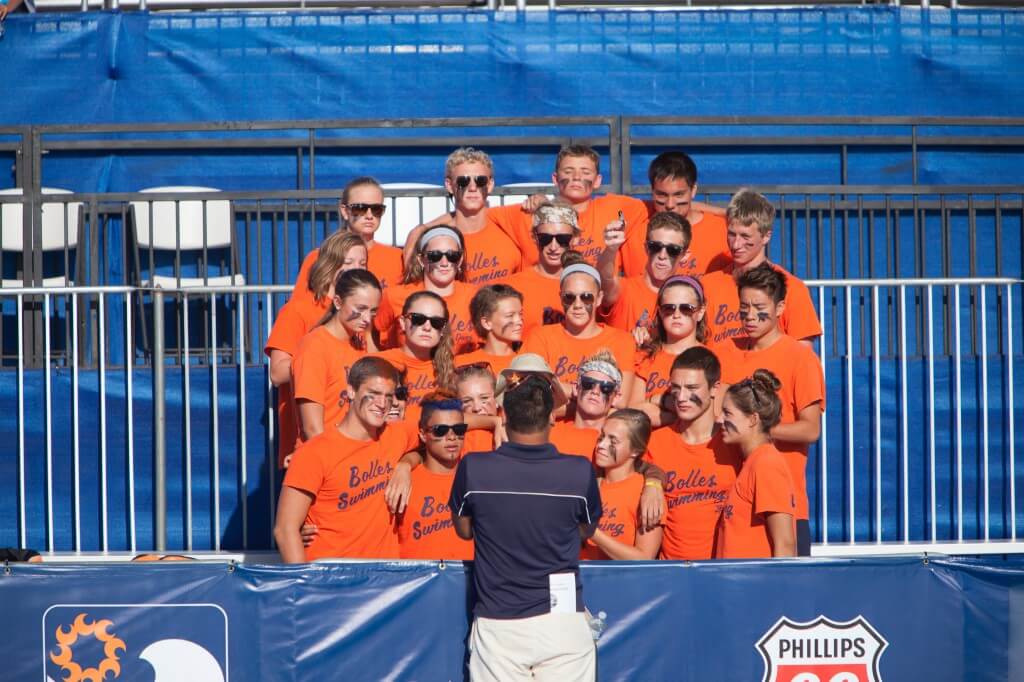
Prep School Power: How the Bolles School became a powerhouse in high school swimming (from September’s Swimming World Magazine)
Since Swimming World first began recognizing the top high school teams in the country in 1971, The Bolles School of Jacksonville, Florida, has won 18 national prep school titles—10 boys’, eight girls’. The Bulldogs have also captured 12 combined championships (public and independent schools), with both teams finishing No. 1 six times.
When Gregg Troy arrived on deck at the Bolles School in the fall of 1977, he had five swimmers at his first team meeting. The girls’ team was coming off a state title the season before, and the boys were national prep school runners-up. But the team was heavily hit by graduation, and Troy had little to work with in his first season.
“The headmaster when he hired me said, ‘Before you take this job, I want you to understand you’re not getting into what you think you’re getting into,’” Troy said. Bolles had a history of being really good, but the team was at a bit of a standstill. The boys had won four straight state titles in the 1950s, but didn’t win again until 1972.
“I had a unique dynamic where the headmaster hired me directly, and he understood what we were trying to do. He gave me pretty much a free hand to do it, and that might be the most important thing. If your administration doesn’t have the same vision you have, you’re in trouble. His vision was they had been good, and he wanted them to continue to be good, but they weren’t.”
THE BOLLES SCHOOL’S ROAD TO SUCCESS
In order to build the high school team into a power again, Troy focused on building the club team.
“We started the club from scratch, but there was a little age group program that swam at that school called the Southside Sharks that was run by Tom O’Hara, a real fantastic age group coach. So what we did was put the two together—I took the high school kids and changed the name from Southside Sharks to the Bolles Sharks.”
Troy had developed a reputation in the state of Florida for really working his athletes, and a number of his swimmers from Fort Myers relocated to Bolles. In 1979, the girls won their second state title—the first under Coach Troy—and two years later, the boys achieved their first state title for Troy (and sixth since 1951). Bolles was again becoming a powerhouse in Florida…and the success became contagious.
“Once we started to have success, and the school had a tradition for it, then we started to attract some people to the dorms. The first year, I got lucky and had some really good high school guys join the club team.”
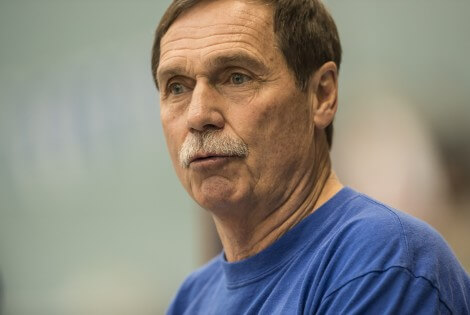
Gregg Troy was at the Bolles School for 20 seasons. Photo Courtesy: Peter H. Bick
In 1983, Bolles swept the state titles, with the girls claiming their first Swimming World national prep school title the next year.
“The people who got better were the ones that worked the hardest,” Troy said. “The swimmers started believing, ‘If I want to be good, I better work hard.’ “We had a situation where people came to Jacksonville to swim because they were looking for the challenge. They weren’t looking for an easy way, and we had established the program in town off challenge. The challenges and aspirations were to be the very best we could be, and the school had that academic reputation, so it permeated from the people you were working with: there was a real goal to be good.”
The Bolles girls repeated as national champions in 1985, while the boys had won six state titles in 10 years in the 1980s. Bolles had been attracting swimmers from around the world, as international students could move to Jacksonville and stay in the dorms while attending Bolles, a precursor to what they would experience in college. By 1988, Bolles had started a boys state championship streak that has yet to be broken, while the girls have not lost since 1991.
“When (the state meet) was moved to the fall, that created the dynamic where the state meet became a stepping stone,” Troy said. “The whole thing wasn’t based around winning championships—it was based around personal improvement. How good could you be?
“We get that all wrong sometimes. The personal improvement is where the championships come from.
“We always had great age group coaches: Tom O’Hara, Rick Hatlestad, Jeff Poppell, Martyn Wilby. The school was receptive to the program and receptive to the success, and they liked the economics of people coming to stay in the dorm. I worked for the same headmaster the entire 21 years I was there. It became a cultural thing.”
So in 1997 when Troy got offered the job at the University of Florida, it was difficult for him to leave a place he called home for over 20 years: “It was extremely difficult. My sons were in school there, my wife was from Jacksonville. I didn’t really envision myself leaving, and I had turned down the Florida job once.”
When Troy left and former assistant coach Larry Shofe took his place from 1998-2002, Bolles did not skip a beat. The boys and girls both won overall national titles in 1998 and 2000, while the boys were recognized as the top prep school in 1999.
THE POST-TROY ERA
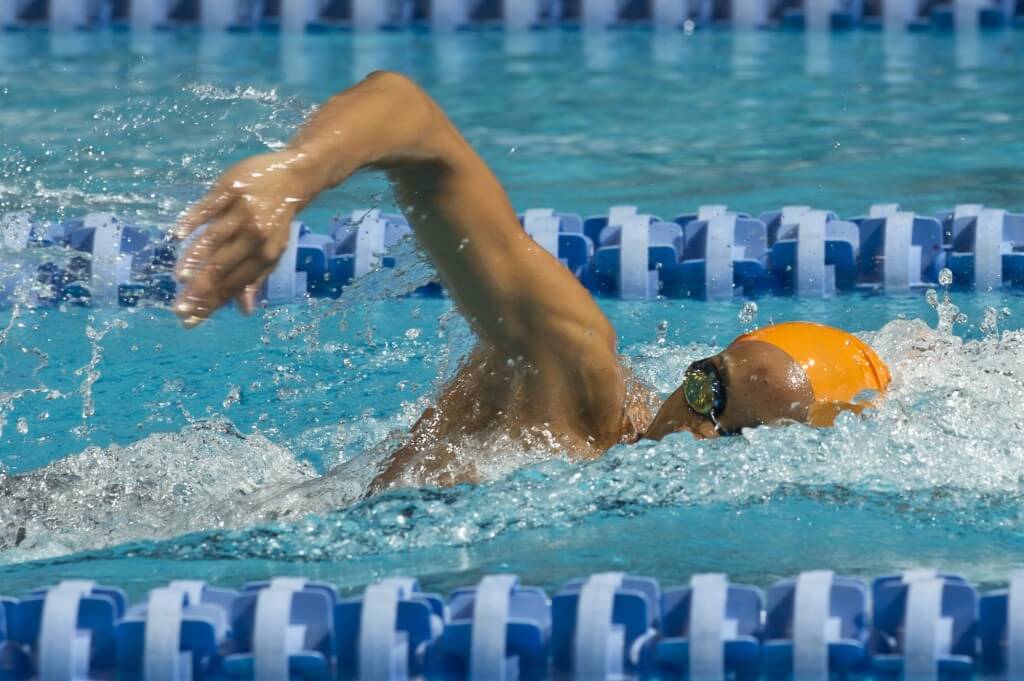
Arianna Vanderpool-Wallace. Photo Courtesy: Peter H. Bick
In the early 2000s, The Bolles School had grabbed the attention of Arianna Vanderpool-Wallace and her family. By 2005, the promising swimmer from the Bahamas found herself in Jacksonville as a boarder student.
“My brother was going off to a postgrad year, and my parents were like, ‘Well Arianna, you should probably go, too, and be on your own.’ They were going to send me to the same school as him, but it was in Canada. When I got up there, I was like, ‘I don’t want to live in Canada—it’s far too cold.’ So we looked at schools in Florida and somehow stumbled upon Bolles—and literally within a week of my parents having this idea, I was enrolled at Bolles.”
Vanderpool-Wallace’s time at Bolles was unique since each year she was there, she had a different head coach. Poppell started in 2005, then Rick Bishop in 2006, and finally Sergio Lopez came in 2007.
“I loved every single one of them!” she said.
“For the top-end swimmers, we were just at that level where we understood Bolles wasn’t going to bring in a coach that wasn’t great at what they did, so we trusted and believed in them. It was pretty interesting because all three coaches have very different coaching styles.
“Jeff Poppell focused on a lot more quantity, and we switched to Rick Bishop, who was very quality over quantity. I remember doing sets with him where we would do three 100s off the blocks with a lot of rest, but each three had to be perfect, compared to 30 100s…and you start to kind of fall apart.
“Sergio was kind of a mix of the two, so it was really cool to have those three different styles of coaching.”
In looking back at her swimming career, Vanderpool Wallace believes she would never have had the success she had without her experience at Bolles:
“In my brain, I had a goal of going to the Olympics, but I never in a million years thought I would have an NCAA record under my name (100 yard free) until Simone (Manuel) broke it.
“I never even believed that was possible, and I think being at Bolles and training with the people I got to train with, I learned what hard work was really like.
“I think because of Bolles, my goals changed drastically. I went from wanting to maybe go to one Olympic Games and just show my face to winning NCAAs and (going to) three Olympic Games (2008-12-16).”
In 2012, Vanderpool-Wallace became the first ever swimmer from the Bahamas to swim in an Olympic final, when she placed eighth.
THE SERGIO LOPEZ ERA
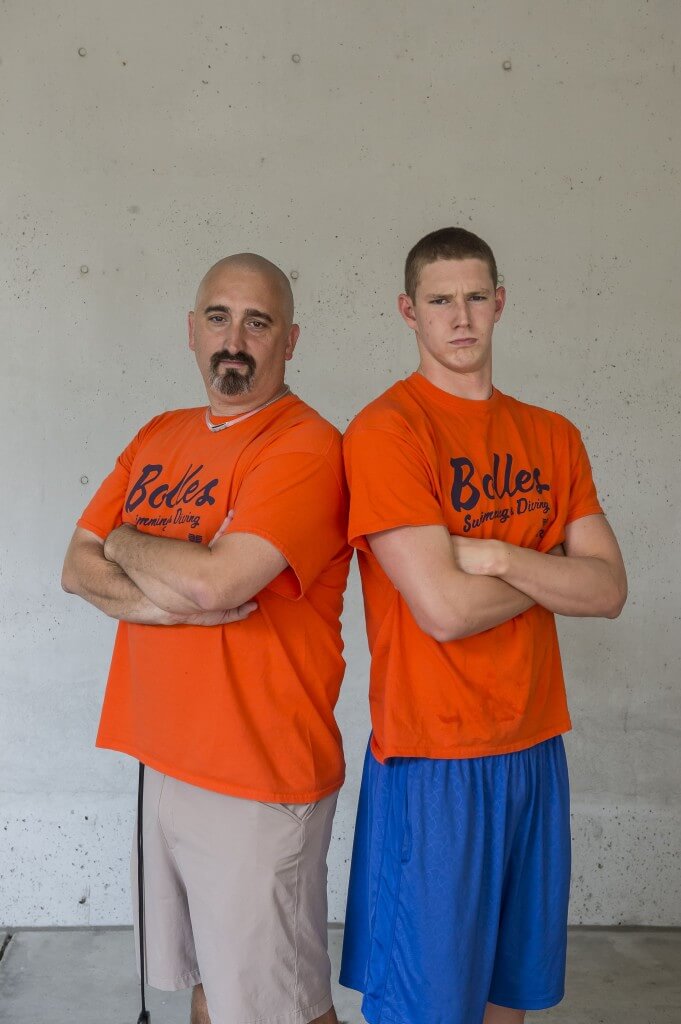
Sergio Lopez & Ryan Murphy – coach and swimmer at the Bolles School in 2013. Photo Courtesy: Peter H. Bick
In 2007, Sergio Lopez had been hired at Bolles to take over for Rick Bishop. It was the third head coach for the program in three years, and the swimmers had been exhausted from the lack of consistency. Quickly, Lopez implemented his own style and started his own team culture. The system included no morning practices for kids until they got to high school. When they were freshmen, they would do a double on Monday, while sophomores would go doubles on Mondays and Fridays, and upperclassmen would go Monday-Wednesday-Friday doubles.
“I had kids who were in seventh grade already doing a lot of yardage and a lot of sessions, so I had to change it,” Lopez said. “At the beginning, people thought I was crazy because I don’t do a lot of volume.
“I don’t believe in a 14-year-old kid that needs to do 9,000 a practice twice a day. I don’t understand how to write a practice that long. So I had to change a lot of stuff.”
In Lopez’s second season, a young 13-year-old kid with a lot of talent named Ryan Murphy had walked onto the deck for the first time as a Bolles swimmer.
“Ryan Murphy was already a good swimmer,” Lopez said. “He was a national age group record holder. I didn’t coach him the first year. I decided he didn’t have to be swimming with the high school team to swim fast. I put him with the age group coach with Christian Bahr. That year, I watched him and talked a lot with Christian about the way he was developing and the way he felt, and I created a four- year plan for the years he would be with us in the senior group.”
A year later, Bolles had picked up two more boarder students with a lot of talent: 14-year-olds Santo Condorelli and Joseph Schooling.
“One of the things you could see with the coaches that I had, all of them were young coaches and they really believed that maybe these guys could be in the Olympics one day and swim really fast.”
So when all three boys had gotten to the high school team in 2010, Lopez knew he had a special group in place.
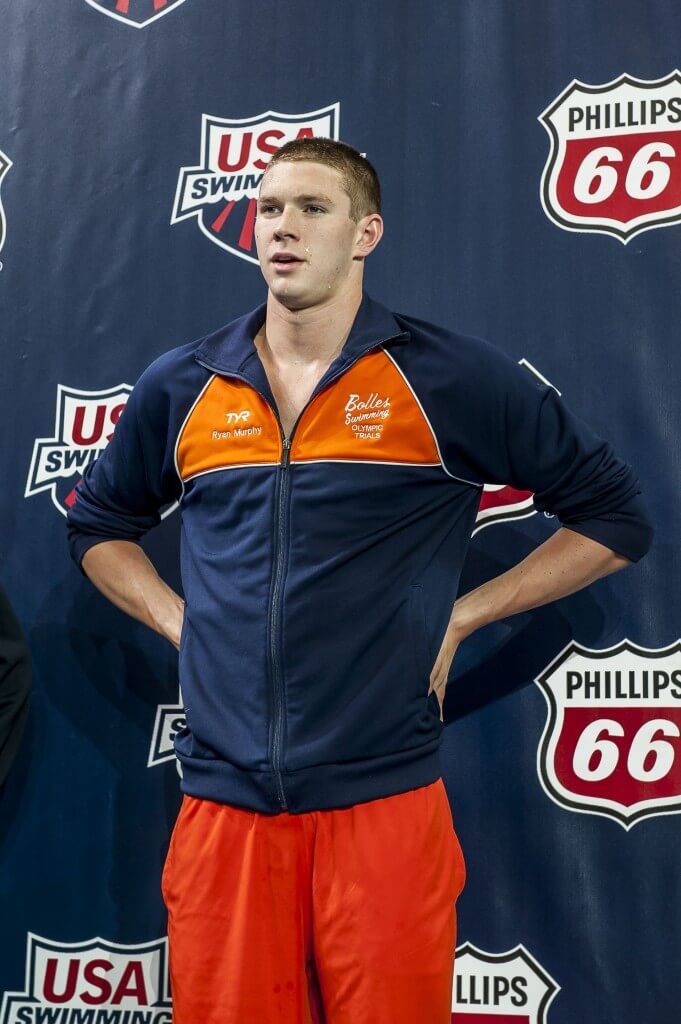
Ryan Murphy at the 2013 Nationals. Photo Courtesy: Peter H. Bick
“One of the things I tried to create as a coach and one of the things I learned coming from American (University) is how to build a team dynamic and embrace it. If we embrace it and empower one another, we will be excellent. I’ve always believed success is contagious.”
“It was cool because the talent level was insane,” Murphy said. “That talent level is hard to find on the college level and we were lucky to have it in high school. It was cool because everyone had different strengths and weaknesses and completely different personalities. The way that all meshed was really cool.
“Santo didn’t want to line up next to me and Joseph all the time because frankly Santo was not as great of an aerobic athlete. But the second we were getting ready to do a pace set, he wanted to be right there and be in the thick of it and he could really push some impressive stuff. When he was doing those pace sets, he was not afraid to let you know it when he was beating you.
“Joseph was really awesome to train with. We had pretty similar skill sets. Any given set you would give me and Joseph and we would be pretty much going the exact same times all the way through. And even when we were doing pace, he’d be going fly and I’d be going back and we would try to race every single thing.
“And then when we were able to infuse Caeleb (Dressel) into the group in the summers and on Saturdays. Oh man, that was a lot of fun, because that guy in high school had the ability to go fast whenever and it was really really impressive. That was really fun to infuse into the group.
“What I had the most fun with was when we would do dryland in the mornings. We would go dryland for essentially an hour and 45 minutes and swim like a 300 off of it on Wednesdays. Those dryland sessions were so intense and we would do target boxing and just get so hyped: blast music, everyone would have a ton of energy around the room. I absolutely loved that part.”
Heading into the 2012-13 high school season, Murphy and Condorelli were seniors, and Schooling was a junior. The team had won two national and three straight prep titles the previous three years, and had one of the most talented teams in place for one more season.
“I really think they wanted to do something special,” Lopez said of that team. “I cannot tell you every day was a happy day because I think that happens to everybody, but every day, it was exciting to go to practice. These guys would challenge themselves all the time. They would be helping one another and teaching one another how to start better and do a better relay start. So there were a lot of really neat things happening in an organic way. It was exciting to watch that.”
At the 2012 state meet in November, Bolles had already broken two national high school records in the 200 medley (1:28.02) and 200 free relay (1:19.27), and Murphy, Schooling and Condorelli wanted to break all three relay national records. That left the 400 free relay as the final challenge.
“We went into the 200 medley relay and didn’t really have a breaststroker – we had to slide Joseph into breaststroke so that one we were good but this one will probably get broken pretty quickly,” Murphy said.
“The 200 free relay, Santo was a really good 50-100 free guy but for the rest of us the 50 free was not even in the top three events so we were just thinking this was fun – it was a 200 free relay! We were going to get really excited.
“But the 400 free relay, I remember us huddling up before it and one of our assistant coaches was like ‘let’s put this record into the stratosphere. This shouldn’t be broken for a while here.’”
Bolles swam a 2:54.43, breaking the record by six seconds that they had set the year before. The record has been broken since, but still stands as the independent school record.
Murphy and Condorelli went on to swim at Cal and USC, respectively. Schooling went off to the University of Texas the next year, while Caeleb Dressel, who had swum briefly at the Bolles club team, went to the University of Florida.
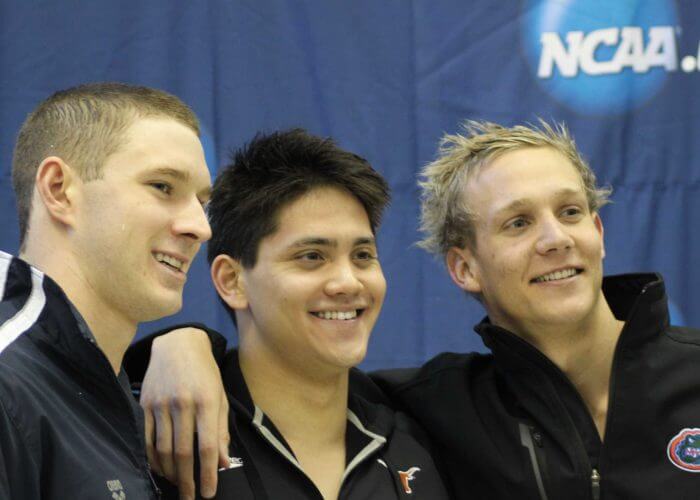
Ryan Murphy, Joseph Schooling & Caeleb Dressel. Photo Courtesy: Andy Ringgold / Aringo Photos
After their high school careers had ended, one moment stands out for Lopez. At the 2016 NCAAs, Dressel, Schooling and Murphy had all been voted as co-swimmers of the meet for breaking two NCAA records each – Dressel in the 50 & 100 free, Schooling in the 100 & 200 fly, and Murphy in the 100 & 200 back.
“That’s never happened in history—coming from the same club. That was one of those things that gives you goosebumps.”
Later that summer, those three, along with Condorelli, had represented their home countries at the Olympic Games in Rio. Lopez was on hand, coaching Schooling to Singapore’s first-ever Olympic gold medal in the 100 butterfly.
“Joseph is one of those guys—and I would put Santo and Caeleb in this category, too—those guys are friends for life,” Murphy said, who also won three gold medals in Rio in the 100 & 200 backstroke and the 4×100 medley relay. “It’s really cool to see the journey. Joseph came into Bolles as a 14-year-old, and to see the growth he had as a 14-year-old kid to winning a gold medal at age 21, I mean that’s really cool.
“There’s so much work that goes into that that nobody really knows about—physical and mental sacrifices within the family— and to see it all pay off was incredible to see.”




Dionne Vanscoy
Congrats Sergio Lopez Miro for your outstanding work and inspirational coaching style!
Andrea Vergani european medalist thanks Bolles for the graet experiance⅘
Christian Bahr nice mention in the article.